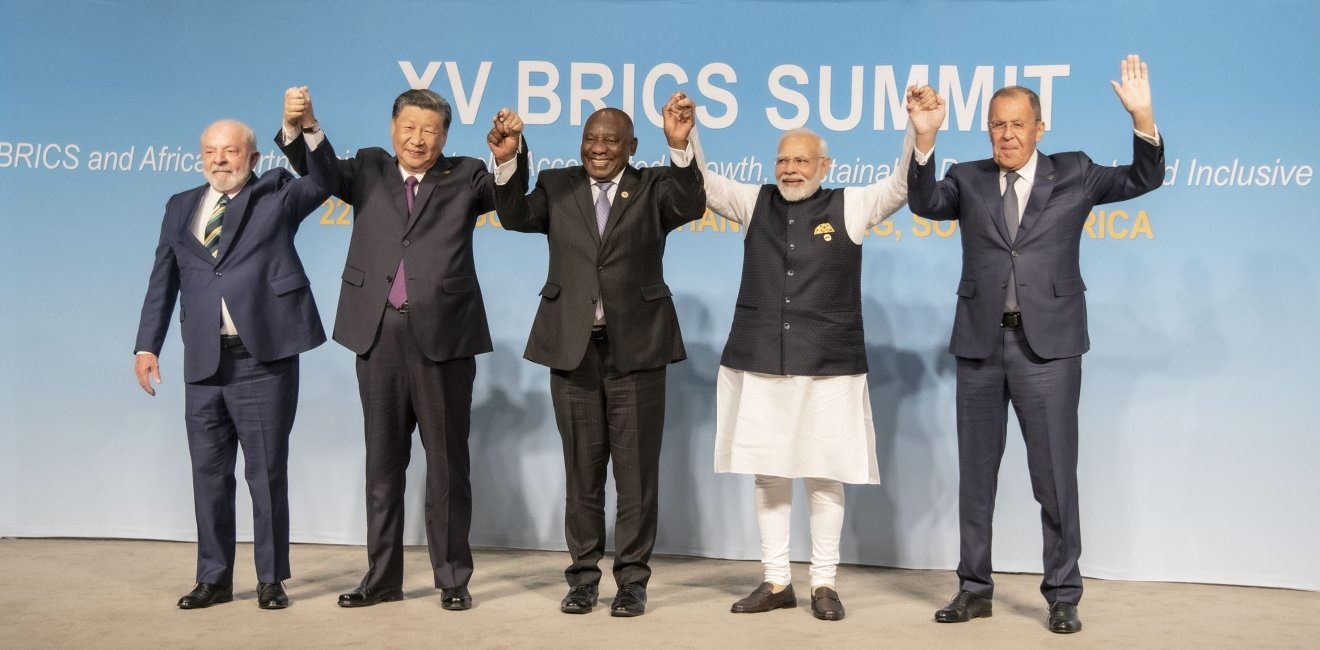
A blog of the Kennan Institute
Recently, Russia's primary television station, Channel One, made an abrupt change to its broadcast schedule. Instead of airing a documentary by the prominent Kremlin-aligned journalist Vladimir Pozner, the network opted to feature a program focused on the upcoming BRICS summit. In Russia, the programming choices of the main TV channel provide a clearer signal than official statements about what the Kremlin deems truly significant.
An extraordinary campaign is underway in Russia ahead of the BRICS summit, scheduled for October 22–-24 in Kazan. This event is positioned as a direct challenge to the West, with Putin aiming to showcase it as his coalition, an alliance containing more influential players than those aligned with Western powers. The Kremlin also emphasizes that the group includes some of the world’s most populous nations, branding it the “global majority.”
The acronym BRIC was coined in the early 2000s by a Goldman-Sachs economist to highlight investment opportunities in Brazil, Russia, India, and China. Initially a marketing term, it evolved into a loose political club in the late 2000s, with South Africa joining shortly after, forming BRICS. Today, the group has grown to include ten members. Recently, Cuba submitted a request to join as a partner country, and Azerbaijan has officially applied for membership. According to Russian state media, around thirty countries have expressed interest in joining BRICS, including Algeria, Venezuela, Zimbabwe, Indonesia, Kazakhstan, Sri Lanka, Thailand, and Turkey.
Defying International Law
According to Russia’s Foreign Ministry, one of the key prerequisites for BRICS membership is that applicants must not engage in “illegal sanctions or restrictions” against any of the BRICS members. Putin frequently criticizes the West for its hegemonic tendencies and for “poking its nose” into Russia’s business, emphasizing that BRICS operates on entirely different principles.
Moscow portrays BRICS as a group of partners that respect each other’s sovereignty and refrain from interfering in internal affairs. In practice, this means that attempts to hold these countries' leaders accountable for war crimes, human rights abuses, or the suppression of free speech by bodies like the International Criminal Court (ICC) are discouraged. A prime example is the ICC’s arrest warrant for Putin for unlawful deportation of Ukrainian children to Russia. Moscow has been working hard to demonstrate that Putin and other top officials are beyond the reach of international law.
Many current and prospective BRICS countries are signatories to the ICC treaty, which obligates them to arrest Putin if he enters their territory. In August 2023, Putin notably did not attend the BRICS summit in South Africa, an ICC member, owing to concerns over a potential arrest. However, he recently traveled to Mongolia, also a signatory, without being detained. This visit appeared to be largely orchestrated to showcase Moscow’s ability to defy international legal sanctions.
Showcasing Nonisolation
From Putin’s perspective, the upcoming BRICS summit in Kazan, a city on the Volga River about 500 miles east of Moscow, is an ideal location. It offers both security and a symbolic display of Russia’s lack of isolation. A large foreign delegation is expected in Kazan, including Xi Jinping (China), Narendra Modi (India), Cyril Ramaphosa (South Africa), and Lula da Silva (Brazil). Recep Tayyip Erdoğan, who continues to navigate a delicate balance between the West and the East, is also expected to attend. His interest in joining BRICS is particularly significant for Putin as it involves a NATO member.
There is additional intrigue surrounding the potential participation of UN Secretary-General António Guterres at the upcoming summit, as reported by the United Nations Information Center in Russia. While no official confirmation has been made, the likelihood seems high. It is worth pausing to consider the broader context in which this is taking place.
Every day brings new reports about the war in Ukraine, about political persecution, arrests, and convictions in Russia. Meanwhile, journalists continue to uncover fresh evidence related to the attempted murder of Russian opposition leader Alexei Navalny in a Siberian penal colony. Putin has effectively canceled elections and fully consolidated power, abandoning even the pretense of democracy. International law has been openly disregarded. Despite this, the UN secretary-general appears poised to pose for photos with Vladimir Putin in Kazan. One reason for Guterres’s visit is that BRICS, as a collective body, has proposed several reforms to the UN. Guterres could claim his purpose was to discuss the future of the United Nations.
BRICS Is Not a Putin Bloc
Putin, meanwhile, will try to prove that he is the leader for a more important part of the world than the West. The time of the United States and Europe has passed, the time of the global south and Russia is coming. This narrative is increasingly heard from Moscow. How true is it?
Stephen Sestanovich, former ambassador-at-large and adviser to Madeleine Albright, recommends, however, not to overestimate BRICS. In an interview with TV Rain, an independent Russian-language television channel, Sestanovich told me that there is no unity within the organization. For example, BRICS includes obvious opponents: Iran and Saudi Arabia. China is loath to publicly showcase its relations with Iran because it needs to keep its trade with the United States and Europe going. BRICS thus is more of a platform that gathers those dissatisfied with the West and allows them to express this dissatisfaction. The Kremlin is not able to resolve the group’s internal contradictions, Sestanovich says. Meanwhile, Russia’s political elite and society are still pivoting to the West, not the East.
BRICS is not a bloc dominated by Russia or China, nor is it an alliance, notes Jean-Joseph Boillot, research fellow at the French Institute for International and Strategic Relations (IRIS). The vast majority of countries in the global south do not want to fall into dependency on any single power, be it Russian, Chinese, or even the United States. During the Cold War, countries like Angola that aligned with one geopolitical pole are now regretting it. The ongoing expansion of BRICS disperses power within the organization, preventing any one nation or group from gaining dominance. This also explains the slow progress on establishing a monetary alternative to the dollar or making significant disbursements from the BRICS bank, which is now led by a Brazilian.
BRICS represents the rise of non-Western leaders on the international stage who resist aligning with any single “camp” in global politics. They prioritize a multivector approach to international relations, aiming to build strategic, mutually beneficial ties with major powers, regardless of ideology, behavior, or cultural differences. While most BRICS members include Russia on their list of countries they deal with, this does not imply approval of Moscow’s wars or recognition of Russia as a leading figure within the group.
The opinions expressed in this article are those solely of the author and do not reflect the views of the Kennan Institute.
Authors


Editor-at-Large, Meduza

Kennan Institute
After more than 50 years as a vital part of the Wilson Center legacy, the Kennan Institute has become an independent think tank. You can find the current website for the Kennan Institute at kennaninstitute.org. Please look for future announcements about partnership activities between the Wilson Center and the Kennan Institute at Wilson Center Press Room. The Wilson Center is proud of its historic connection to the Kennan Institute and looks forward to supporting its activities as an independent center of knowledge. The Kennan Institute is committed to improving American understanding of Russia, Ukraine, Central Asia, the South Caucasus, and the surrounding region through research and exchange. Read more

Explore More in The Russia File
Browse The Russia File
Chechnya as a Model of Modern Russia

Russia’s Indigenous Communities and the War in Ukraine

Gas and Power in a Changing US–Russia Relationship

